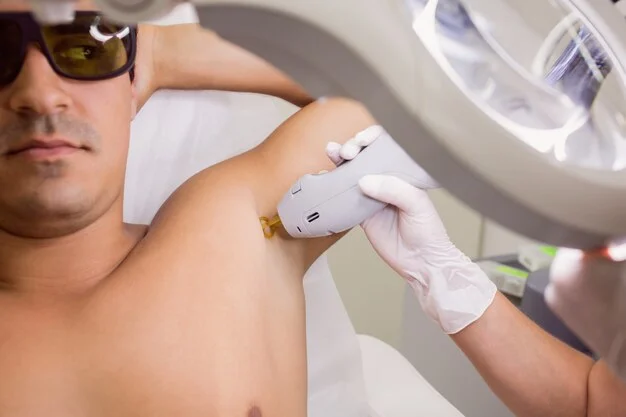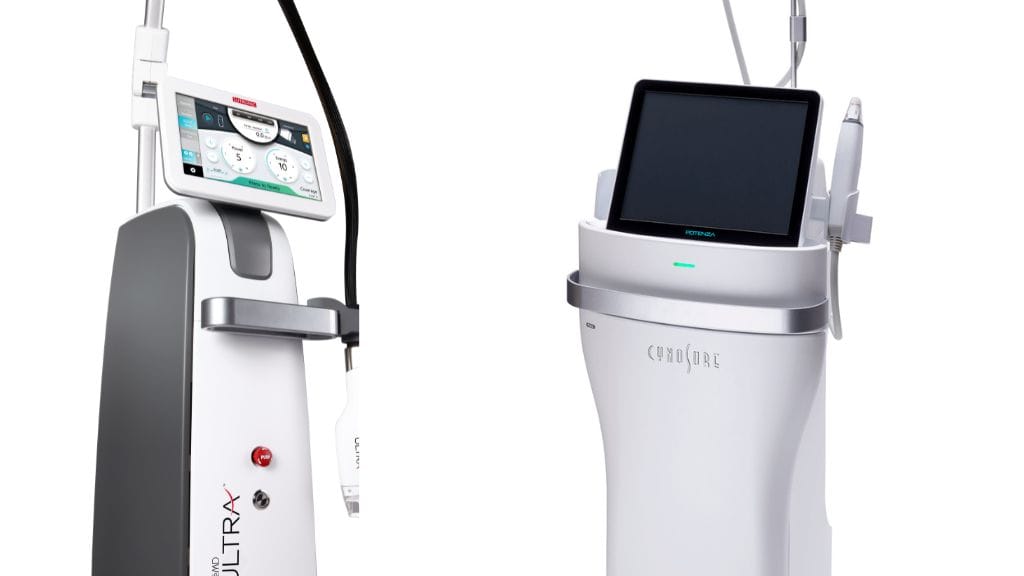Home » Blog » Can Laser Hair Removal Cause Cancer? (or Infertility)
Laser hair removal has become a popular solution for achieving smooth, hair-free skin in Ottawa (and the rest of Canada).
This safe procedure for getting rid of unwanted hair is performed by trained professionals, and uses advanced technology to stop hair follicles from growing new hair.
While laser treatment is generally considered safe and provides long-lasting results, some people have concerns about its possible side effects, including the rumored link between laser hair removal and cancer risk.
Does laser hair treatment cause cancer? In this article, we will delve into the potential negative effects of laser hair removal, address common misconceptions, and help you make an informed decision about this permanent hair reduction method.
Table of Contents
ToggleLaser Hair Removal Side Effects
Laser hair removal employs high-heat lasers to target hair follicles, which can lead to temporary side effects.
It’s important to note that these reactions are usually minor and similar to those experienced with other hair removal methods, such as waxing.
Redness and Irritation:
Following laser hair removal, it is common to experience temporary irritation and mild redness in the treated area.
This typically subsides within a few hours.
To minimize discomfort, your laser provider or medical aesthetician may apply a topical anesthetic before the procedure.
If irritation persists or worsens, it is advisable to consult your doctor or provider.
Pigmentation Changes:
Another temporary side effect is slight darkening or lightening of the skin in the treated area.
Individuals with lighter skin may notice darker spots, while those with darker skin may observe lighter areas.
Rest assured, these changes are usually temporary and pose no cause for concern.
Also Read: How To Treat Hyperpigmentation After Laser Hair Removal
Rare Severe Side Effects
While rare, there are potentially severe side effects associated with laser hair removal.
It’s important to be aware of these risks, especially when using at-home laser kits or seeking treatment from untrained providers.
Excessive Hair Growth in the Treated Area
In some cases, laser hair removal may lead to excessive hair growth in the treated area.
This uncommon, unwanted side effect is called paradoxical hypertrichosis and is estimated to occur in 3% of those undergoing laser hair removal.
This can sometimes be mistaken for hair shedding post-treatment.
If you notice unexpected hair growth, it is advisable to consult your doctor or provider for further evaluation.
Changes to Overall Skin Texture
Occasionally, laser hair removal can cause changes in the texture of the skin, particularly if you have recently tanned.
Those who are prone to scarring may be at a higher risk.
If you experience noticeable changes in skin texture, it is essential to seek professional advice.
Blisters and Skin Crusting:
Exposing the treated area to sunlight too soon after laser hair removal can result in blisters and skin crusting.
Following post-treatment care instructions provided by your laser hair technician or medical aesthetician and avoiding excessive sun exposure is crucial.
Related: How To Get Rid Of Acne (and Other Post-Laser Hair Removal Side Effects)
Can Laser Hair Removal Cause Cancer ?

Rest assured, laser hair removal does not cause cancer.
Laser therapy for hair removal operates by directing a concentrated light beam, which, unlike ionizing radiation or harmful UV wavelengths, is non-ionizing and safe for most individuals.
This focused light energy effectively destroys hair follicles, inhibiting future hair growth without causing damage to surrounding tissues.
The lasers emit minimal radiation and specifically target follicles, avoiding the DNA-damaging effects associated with UV rays.
In fact, the Skin Cancer Foundation not only supports the safety of laser hair removal in regard to cancer risk but states that laser therapy is used to treat precancerous lesions, thus reducing the risk of developing skin cancer.
Can Laser Hair Removal Cause Breast Cancer?
Similar to the previous misconception about laser hair removal skin cancer risk, laser hair removal does not increase the risk of breast cancer.
As explained earlier, laser and IPL systems all utilize non-ionizing radiation; this type of energy does not affect the DNA strands.
It is this breakdown of DNA which may lead, in the long term, to cancer.
Moreover, the lasers cannot penetrate deep enough to harm breast tissue.
Electrolysis vs. Laser Hair Removal: A Comprehensive Comparison for Permanent Hair Removal Treatment
Can Laser Hair Removal Be Used During Pregnancy?

Laser hair removal is generally not recommended during pregnancy.
Although no human studies have specifically addressed the safety of laser hair treatments during pregnancy, it is advisable to wait until after delivery.
Excessive hair growth during pregnancy is typically temporary and often resolves on its own postpartum.
Related: Laser Hair Removal in Pregnancy – Is It Safe?
Can Laser Hair Removal Cause Infertility?
No evidence suggests that laser hair removal causes infertility.
The procedure only affects the surface of the skin and does not reach reproductive organs.
However, if you are actively trying to conceive, it is always wise to discuss potential risks with your doctor.
Conclusion
Laser hair removal is a generally safe and effective method for long-lasting hair reduction.
While temporary minor side effects may occur, severe reactions are rare.
It is important to consult a qualified laser hair technician or healthcare professional for laser hair removal treatments to minimize any potential risks.
Book an appointment for laser hair treatment using Cynosure’s Elite IQ laser – dual wavelength laser that treats all skin types.
Debunking common myths, laser hair removal has not been found to cause cancer, including breast cancer, or impact fertility.
By understanding the facts, you can confidently make decisions about laser hair removal to achieve the smooth, hair-free results you desire.

Dr. Lian Peter, MD, MPH, CCFP, is a Family physician with a passion for aesthetics. In her aesthetic clinic, she provides a wide range of minimally invasive and non-invasive procedures, constantly honing her skills to deliver exceptional care and help patients attain their desired appearance.






